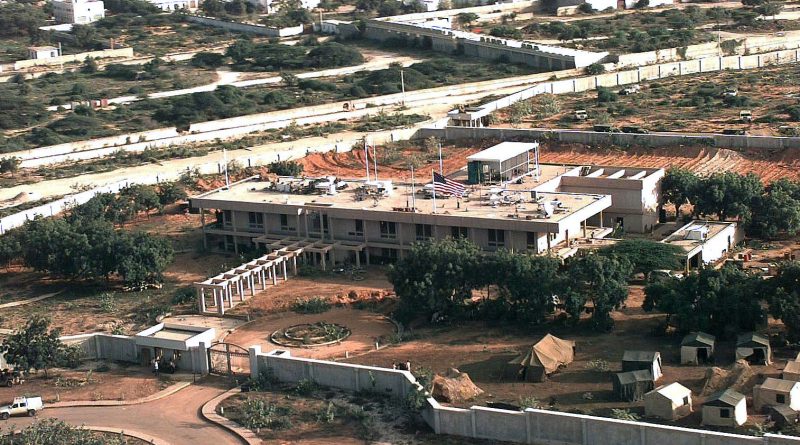U.S. Restores Diplomatic Ties with Somalia, Reopens Embassy
Harshanna Ghoorhoo
Staff Writer
Nearly three decades after its closure following the outbreak of civil war, the United States has officially reopened its embassy in Somalia, according to Al Jazeera.
In a statement released on Wednesday, October 9, U.S. ambassador to Somalia Donald Yamamoto affirmed that the reopening reflects recent progress made in the Horn of Africa nation. The Ambassador stated that the move will serve to strengthen the relations between the American and Somali people as well as to normalize U.S. diplomatic engagement in Mogadishu, Somalia’s capital city. He further asserted that the reopened embassy will “enhance cooperation, advance U.S. strategic interests, and support our overall security, political, and economic development goals and objectives,” VOA reports.
The statement came at a time when the Somali Partnership Forum, a two-day meeting between global representatives and Somali leaders, took place in Mogadishu for the first time. During the meeting, the U.S. Agency for International Development announced the funding of about $257 million in humanitarian assistance to Somalia.
After the breakout of the 1991 Somali civil war resulted in the overthrow of then-President Siad Barre’s military regime, Washington took a step down from maintaining diplomatic ties with Somalia, shutting down its embassy and airlifting the U.S. ambassador to safety. As stated by Military Times, the U.S. attempted to recreate political connections as it established a permanent diplomatic presence in Mogadishu in September 2018, but main operations continued in neighboring Kenya.
President Trump’s administration continues to make considerable efforts in improving the political and military situation in the African country. As reported by the BBC, America greatly increased aid and military engagement in Somalia and makes it a priority to defeat Islamist terrorism in the Horn of Africa as part of its global anti-terrorism efforts.
However, amidst the positive aspects of re-establishing the U.S. embassy, Somalia still faces a significant threat from the insurgent terrorist group Al-Shabaab. On Monday, October 7, Al-Shabaab militants launched a raid on the U.S. specials forces military base in the town of Baledogle, the Guardian stated. The U.S. Army uses the base to train Somali special forces and as a launching ground for drones and airstrikes. On the day of the Somali Partnership Forum, Al-Shabaab militants also carried out attacks about 30 kilometers away from the base, killing at least six Somali soldiers.
The U.S. carried out countless airstrikes in Somalia to combat Al-Shabaab forces in recent years, forcing them to retreat from the major population centers. In an address to the BBC, the U.S. military said that its efforts are supported and encouraged by the Federal Government of Somalia, and “precision airstrikes support our partner security forces’ efforts to protect the Somali people from terrorism.”
According to former head of the United Nations Mission in Somalia, Michael Keating, recent events show that Al-Shabaab militants are regaining a stronghold in rural areas. BCC News reports that the group’s influence again spreads to major cities and towns. Statistical evidence shows that the Al-Shabaab conflict has killed over 1200 people in 2019 so far, compared to less than 400 people in 2015. The United States, the biggest international donor to Somalia, expressed its commitment to helping in stabilizing the region.
The reopening of the embassy in Mogadishu is a positive step in strengthening bilateral relations between the two countries. As reported by the Council on Foreign Relations, this is especially important because it represents a win over the assumption that risk-aversion should be prioritized over actually creating diplomatic ties, which require presence in the region and a multi-layered understanding of the political dynamics that shape the decision-making process on the ground.
At this point, it is undeniable that the U.S. will remain a strong partner to Somalia in its effort to build a stable, democratic country. A big component of that assistance lies in helping Somalia rid itself of the extremists, who continually afflict great pain to the population and pose a detriment to economic progress. As the two countries resume their diplomatic relations, the world hopes that progress will continue to be seen in the Horn of Africa.


